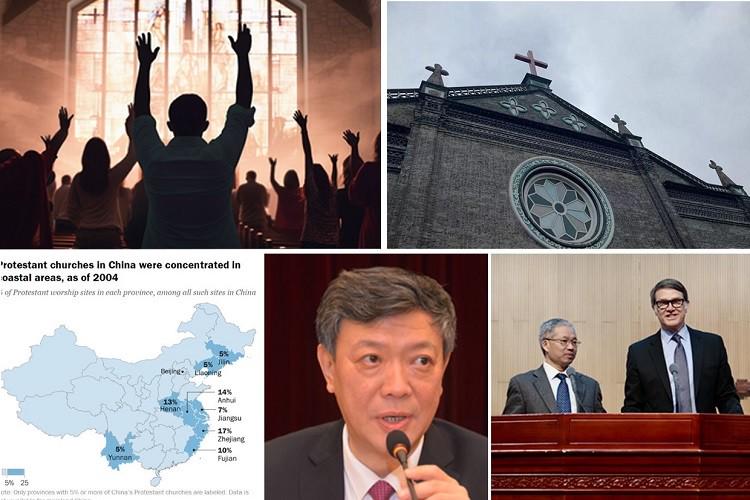After three years of the pandemic, the world started to fully resume in 2023. So did the church in China: in-person meetings and ministries gradually regained their vigor, and international Christian exchanges were restored. The “Administrative Measures for Religious Activity Venues” came into force to manage places of worship, while Pew released reports claiming the stagnation of Christian growth in China. As the sinicization campaign kept underway across the official church, the 2023 Israel-Hamas War provoked arguments and controversies among underground church Christians. Profound changes took place in Christianity in China throughout the year.
As we begin 2024, the editorial team of China Christian Daily (CCD) has selected the top 10 Christian news stories of 2023 based on the number of views, keyword searches, shares, and prominence of articles.
Below is part 1, Nos. 1-5 of CCD's top 10 news stories of 2023. Read part 2 of CCD's top 5 news stories of the year here.
1. The Chinese church expected revival after declining memberships during the pandemic.
The COVID-19 pandemic has brought a common impact to the global church: declining memberships.
Although no statistics indicate how many members the church in China lost, most registered churches and house churches faced declining memberships. A large percentage of official churches witnessed attendance reduced by one-third up to half due to a lack of pastoral care, including insufficient online ministry, urbanization, migrations, secularism and pluralism, etc.
Young people were one of the declining groups. In a church in northeast China, only around ten young adults stayed in a youth fellowship. Some pastors even claimed that nurturing young believers should be the greatest crisis confronting the Chinese church today.
As a response, registered church staff urged their congregations to attend church in person, explore new ways to visit members coupled with psychological counseling, or lead lost believers back through activities. Volunteer training sessions were carried out in grassroots churches to support preaching.
As for the house church, the declining percentage may have varied demographically from ten percent to thirty percent. Under the big picture, several churches and pastors were hungry for revival, especially yearning to revive personal spirituality and reflect on true revival after the spiritual revival of Asbury University in early February. Young and middle-aged Pentecostals kept attention to revival and preached about it.
House church pastors debated whether their churches should keep big or gather in small groups or networks, but most churches gathered in groups or meeting points. New growth modes were explored to consider the model in the apostolic era, small home churches, missional churches, and the gospel ecosystem.
2. China released the “Administrative Measures for Religious Activity Venues” to increase restrictions on the Chinese church.
In July, the National Religious Affairs Administration promulgated the "Administrative Measures for Religious Activity Venues" by Order No. 19, which came into effect on September 1, 2023.
The "Measures for the Examination, Approval, and Registration of the Establishment of Venues of Religious Activities" issued by the National Religious Affairs Administration in 2005 were abolished at the same time.
There are 10 chapters and 76 articles in the new Measures, which are intended to improve the management system of religious activities. The Measures stipulate the procedural requirements for the registration of venues for religious activities, standardize the management, clarify the establishment of management organizations, implement democratic management, establish and improve the personnel management system, and standardize the religious activities, social activities, and foreign exchanges of personnel in the venue. The Measures clarify the responsibilities in the management of religious activities, construction management, and safety management of fire prevention, food, sanitation, and buildings. The Measures require setting up supervisors in religious activity venues, strengthening internal management, clarifying the supervision responsibilities of religious affairs departments, the educational guidance of religious groups, and the supervision rights of religious citizens.
In addition to CCC&TSPM, churches within Guangdong, Hubei, and Jiangsu provinces orchestrated dedicated study sessions to delve into the regulations.
3. Pew Research indicated no clear evidence that “Christianity in China is growing.”
There is not much evidence that Christian growth continued in China after 2010, according to the Pew Research Center.
Published on August 30, Pew’s new research, titled “Measuring Religion in China,” concludes from a range of data that there is no evidence that Christianity in China is growing after 2010.
“Some scholars and journalists have argued in recent decades that Christianity in China is growing rapidly. Indeed, Christianity flourished after China entered an era of economic reforms and “opening up” to the world in the 1980s. But recent surveys that measure zongjiao affiliation do not offer much evidence that Christian growth continued after 2010,” said Pew.
Based on the statistics from the Chinese General Social Survey (CGSS) and the 2018 World Values Survey (WVS) and other government data, “only 2% of adults in China self-identified as Christians in 2010, versus 2% (19.9 million) in the 2018 survey—a gap that is not statistically significant.” The number of legal Protestant venues also remained “largely unchanged” from 2009 to 2018.
The research center continued to release an article titled “China’s Christian Population Appears to Have Stopped Growing After Rising Rapidly in the 1980s and ’90s” in December.
Conrad Hackett, senior demographer and associate director of research at Pew, wrote that China’s Christian population is plateauing. There was an increase of around 22% in the Christian population from six million in 1982 to 14 million in 1997, including a reported growth in the number of believers who gathered in “underground” or house churches, but “between 2010 and 2018, the share of Chinese adults who formally identify with Christianity remained stable at about 2%.”
The two reports refuted the argument about the rapid growth of Christianity held by some Christian scholars in the past years but also invoked opposition from international Christian figures. David Curry, president and CEO of Global Christian Relief, wrote on Fox News, “At best, we might say that after decades of rapid growth, Christianity’s growth in China may be slowing.”
4. The eleventh national congress of CCC&TSPM kicked off.
The eleven national Chinese Christian conference was conducted in Beijing from December 19 to 23, 2023, and attended by more than 300 representatives from across China.
Rev. Wu Wei was re-elected as chairman of the ninth China Christian Council (CCC), and Rev. Xu Xiaohong was president of the eleventh National Committee of the Three-Self Patriotic Movement (TSPM).
The meeting also reviewed and approved the resolutions of the 11th National Congress of Chinese Christianity and heard the financial report of the current session of CCC&TSPM.
Rev. Kan Baoping, vice chairman of TSPM, explained the modifications made to the "Constitution of the Chinese Christian Three-Self Patriotic Movement" and the "Constitution of the China Christian Council."
5. International church and Christian exchanges resumed.
Foreign churches and organizations revisited China for future cooperation, while house churches attended international conferences for renewal and global missions.
Since mid-March, international Christian organizations and churches have resumed their visits to the official church in China, including the United Bible Societies, Billy Graham Evangelistic Association, and the Luis Palau Association.
As the first American Christian organization to revisit China in 2023, Word4Asia Consulting International said in an interview that they enjoyed a VIP welcome in China and “it was good to be back with our friends.” The two sides talked about the sinicization of Christianity, Bible publication and distribution, and providing study tools to train lay preachers.
Delegations from the United States, England, Norway, Germany, and Korea renewed their friendship with the registered church, understood more about the current circumstances, and prepared for future collaborations. November marked the first time for the Russian Evangelical Alliance to visit CCC&TSPM.
In October, representing the China Christian Council (CCC), President Rev. Wu Wei participated in the United Bible Societies World Assembly 2023 in the Netherlands and visited a theological seminary in Europe. Meanwhile, Rev. Prof. Dr. Jerry Pillay, general secretary of the World Council of Churches (WCC), expressed his interest in visiting China in his talk with Rev. Wu.
Nanjing Union Theological Seminary sent members to travel to the United States for the first time since the pandemic. Two seminary leaders attended the board meeting of the Foundation for Theological Education in Southeast Asia.
The faith-based Amity Foundation conducted its first trip to Europe after three years of the pandemic as well, including attending the European Network of Amity Partners (ENAP) meeting in Finland as well as visits to international organizations including the WCC and social service agencies in Finland, Switzerland, and Germany.
House church believers and leaders rushed overseas to attend international Christian conferences. The Amsterdam 2023 Summit united a global effort to fulfill the Great Commission in June. Dr. William Wilson, president of Oral Roberts University and chair of the Pentecostal World Fellowship, invited Chinese Christians to participate in the worldwide campaign.
Southeast Asia was one of the hottest regions. Hundreds of Chinese Christians gathered in Bangkok in July to be inspired to preach the gospel to the unreached. Through collective prayer, worship, and learning, the Lausanne Movement-backed Arise Asia 2023 attracted about 1,700 young people. The Jakarta 2023 Global Convention on Christian Faith, organized by the Reformed Evangelical Movement International and Stephen Tong Evangelistic Ministries International (STEMI), exhorted Chinese believers to put their faith in Christ's reign at all times. International speakers include megachurch pastor David Platt, Wheaton College President Dr. Philip Ryken, and Dr. Michael Oh, global executive director and CEO of the Lausanne Movement.
Karen Luo, Ruth Wang, and Grace Zhi contributed to these reports












